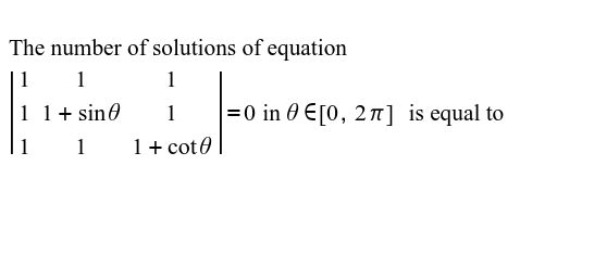Question
Question: The number of solutions of equation $\begin{vmatrix} 1 & 1 & 1 \\ 1 & 1 + sin\theta & 1 \\ 1 & 1 & ...
The number of solutions of equation
11111+sinθ1111+cotθ=0 in θ∈[0,2π] is equal to

Answer
2
Explanation
Solution
We start with the determinant
11111+sinθ1111+cotθ=0.Subtract the first row from the second and third rows:
R2→R2−R1,R3→R3−R1.This gives
1001sinθ010cotθ=1⋅(sinθ⋅cotθ)=sinθcotθ.Since cotθ=sinθcosθ (provided sinθ=0), we have
sinθcotθ=cosθ.So the equation becomes
cosθ=0.Within θ∈[0,2π], the solutions are:
θ=2πandθ=23π.Note: The values where sinθ=0 are not allowed since cotθ is undefined there.
Thus, there are 2 solutions.
